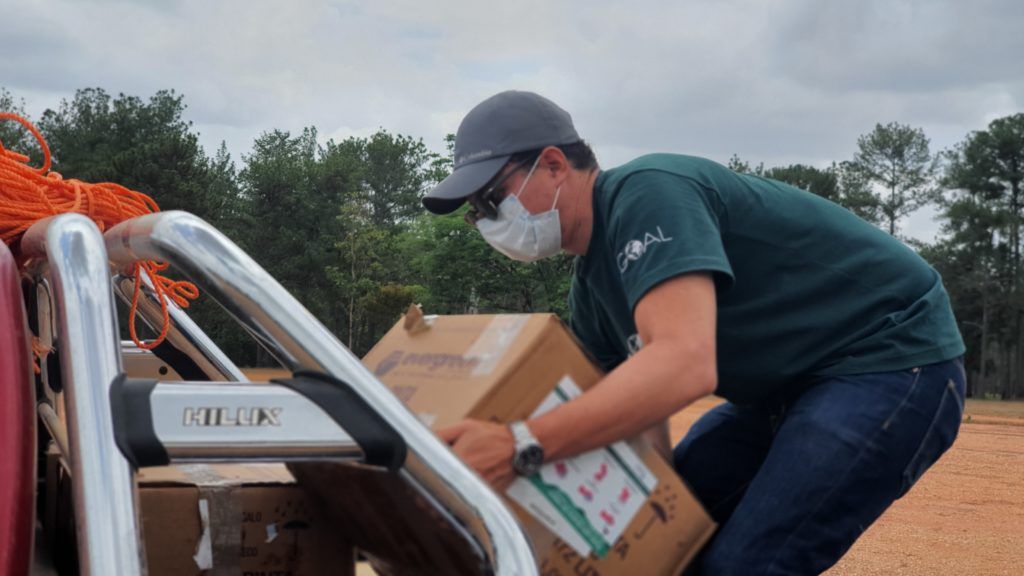 Stories
Stories
July 3, 2020 • 5 min read
As the world grapples with the unprecedented COVID-19 public health crisis, GOAL is committed to doing everything it can to protect some of the world’s most vulnerable populations in the Global South.
GOAL is calling for a community centred, integrated approach to be at the heart of the international response, and on the international community to urgently work together to prevent the loss of life and livelihoods by focusing on actions in six key areas. This focus piece is centred on the area of humanitarian response.
Humanitarian Response

Cash distribution by GOAL in Idlib Province, Syria
In 2020, it is predicted that nearly 168 million people would need humanitarian assistance and protection. According to the UN, this represents around 1 in 45 people in the world and is the highest figure in decades. The impacts of climate change and growing weather related and other disasters continue to pose an additional challenge. COVID-19 has already disrupted global supply chains and has led to the UN to call for $6.69 billion in extra funding.
Those living in fragile and conflict affected states such as Syria, South Sudan, Sudan, Niger, Uganda, Ethiopia, Iraq and Haiti are amongst the most in need. Conflict continues to wreak havoc, destroy societies and displace communities across the world. Now is time to unite with a greater focus on building social cohesion and addressing the underlying drivers of conflict.
The COVID-19 pandemic is impacting social cohesion by increasing distrust between communities, with stigmatisation and scapegoating of minorities, refugees and migrants. GOAL witnesses widening fear and mistrust within communities, and exclusion of groups from access to services, resources and participation in response efforts. In addition to considering specific conflict dynamics, there is also a need to consider the differences between contexts, and that the people being supported may prioritise other needs besides COVID-19.

PPE donations by GOAL in Tegucigalpa, Honduras.
GOAL is working with communities affected by humanitarian crisis to ensure they receive the assistance they need as quickly as possible. GOAL teams are also on the ground supporting communities and local partners to work together to avert conflict and build social cohesion.
In addition, GOAL’s humanitarian team and country teams continue to monitor national early warning systems and prepare additional capacities to help minimize consequences on individuals, communities, governments and systems of other non-Covid-19 related emergencies that might arise. These include responses to floods, locusts, drought, cholera, malaria, Ebola and other diseases in countries like Syria, Ethiopia, Honduras, Sudan, South Sudan, Sierra Leone and Haiti, often in partnership with local authorities or the Ministries of Health. In the rush to respond to COVID-19 those who were already in need of humanitarian assistance must not be forgotten.
GOAL is asking that:
- Humanitarian response plans must be fully funded, and definitions of vulnerability carefully examined to ensure those to at risk and in need can be supported.
- Warring parties must heed the Global Ceasefire call which has been led by the UN Secretary-General.
- Exemptions from movement restrictions for Humanitarian NGO workers are needed to reach the most vulnerable communities in accordance with the Humanitarian principles. Equally, essential global supply chains need to be maintained to ensure the delivery of essential drugs, medical equipment, food assistance, hygiene kits and other non-food items.
Case Study: GOAL’s humanitarian workers in Syria share their stories of displacement
Fareed
Like many others of his generation, Fareed lost a close relative to the conflict in Syria, which is nearing its 9th anniversary without any sign of abating.
Fareed and his family had been able to return briefly to their village in southern Idleb province after their displacements in May, August and October 2019. When they joined the hundreds of thousands of other families that have sought to escape the recent escalation of conflict in in December, however, they knew that they would not be able to go back this time, even if only to collect their belongings. But finding refuge in the northern areas, already hosting nearly a million displaced people by January 2020, was proving equally impossible. Soon after arriving in the town of Salqin in northern Idleb, over 100 kilometers away from their home, they quickly came to the realization that they would have to seek new shelter again.

Displacement Camp in Deir Hassan, Syria
The village, a mere 10 kilometres from the Bab-Al Hawa border crossing with Turkey, had a population of a few thousand before the war. According to data provided by the UNHCR, the UN’s Refugee Agency, Deir Hassan currently hosts more than 120,000 displaced people across 95 informal settlement sites.
The informal settlements in and around the village of Deir Hassan are only the tip of the iceberg, however. By January, the 484 informal settlement sites stretching through Idleb province’s northern districts were hosting a displaced population of almost 700,000, the majority of which were women and children, and the 32 planned camps in Idleb had become home another 70,000 individuals. While GOAL and other humanitarian organizations on the ground strive tirelessly to serve the displaced and host communities of northern Idleb, needs far surpass the assistance that is available.
Fareed’s family were among the fortunate few that were able to find a shelter that could provide at least a little protection. But they had to extend all of their savings to replace the plastic sheets that covered the small brick house with material that could help withstand the harsh wave of cold that has enclosed the region since January. Many others were not so lucky.
In addition to the urgent need for new shelter, for food assistance, and for water and sanitation services, Idleb’s northern districts have also to contend with a lack of access to healthcare and education. “There is a shortage of hospitals and clinics because of the systematic targeting of medical facilities. Schools were not spared from the attacks.
* Some names in this story have been changed.

